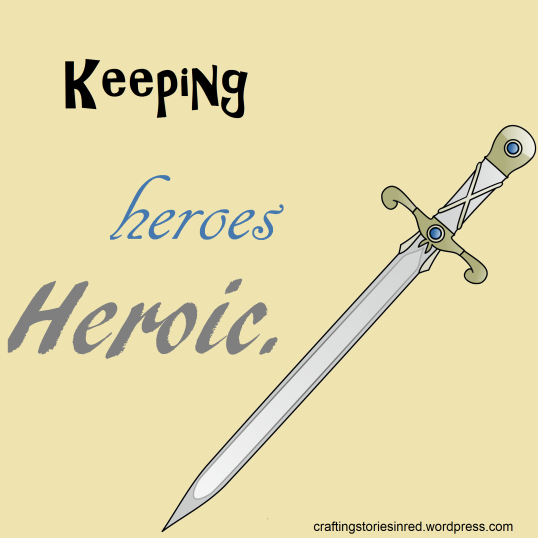Keeping Heroes Heroic
When I was a wee little lass, scarcely old enough to be allowed to remain awake during napping time, far from understanding the complexities of writing—though my timeline is likely a little mixed up (few young children categorize: On this date, at three o’ clock in the afternoon, I decided I want to be a writer), I doubt I had any interest in writing stories at that point.
Ah, but I loved to read. This was a good thing, with all of the reading we young ones did for school in those days, and through studying certain old legends and myths, I found myself a hero. A brave man, strong, the very best of the king’s knights. I adored him, my hero, and through a few weeks of study, decided he must have been the best man in medieval history.
His name was Lancelot du Lac. And before you ask: no, I didn’t know.
The first time I wept at a book wasn’t a gentle sniffle or misty eyes. No, it was with tears streaming down my face, barely able to speak, tears clogging my voice as I gasped, “No, Lancelot, don’t, please.”
On that day, my first hero fell.
He did the thing with Guinevere that even I, a small lass though I was, knew was wrong. I desperately hoped that he’d turn back, that he’d make things right, but the hero that I had loved never did. Furthermore, Lancelot and Guinevere caused everything to fall to pieces. Wow. Well done, you two.
There is so much stress these days on giving your heroes (or heroines) flaws. It doesn’t matter who they are, where they come from, or what they do — as long as they make horrible decisions, mistakes, or are wretched people. While I’m all for having characters that are people (and therefore are fallible, have doubts sometimes, make mistakes, and may have flaws), there’s such an emphasis on making sure they aren’t perfect, that people seem to have forgotten what heroes are.
Heroes are the men and the women who step up and do what’s right, no matter how hard it is. They’re the folks who never give up the fight. Sure, they consider quitting. But eventually, they keep fighting for what is right and good, because that’s what hero does.
To quote The Pirates Who Don’t Do Anything*, “The hero isn’t the smartest, strongest, or the best looking. The heroes are the ones who do what’s right.”
What you look for in a hero, which many people try and fake with flaws, is personality. Instead of throwing in random flaws or terrible habits, take the time to develop your characters into the type of person who is a hero. People look to fiction to find heroes (whether we ought to or not). Make your character the type who inspires your readers to do good.
Though, what matters in the end is not whether or not they were a perfect person during the book. They may have made mistakes at times — huge mistakes. But in the end, if they understand, if they want to make it right, if they’ve learned, and if they’ve turned themselves around, they are heroes.
Lancelot never got that. Perhaps, if Lancelot had turned himself around and did his best to make right what couldn’t really be made right, he would still be my favorite character, or at least the Arthurian Legends would still be my favorite of all the legends.
But this once good hero crashed, failed, and did not find redemption. And I never remember loving any other character as much as I loved him. I never cried over a book as much as I cried over him. I never again trusted a hero as much as I trusted him.
You may be laughing to yourself. Boy, does that sound overly dramatic. But it is true.
Make your heroes heroes. Make them love and live, and die, and make mistakes, but make them right. (Actually, the die part isn’t really necessary.)
As an afterthought: I may still be just a tad prickly about Lancelot. Beware what you comment.
*You may think you’re too old for The Pirates Who Don’t Do Anything. You aren’t. It’s one of my favorite movies — and I am very picky about my movies.



